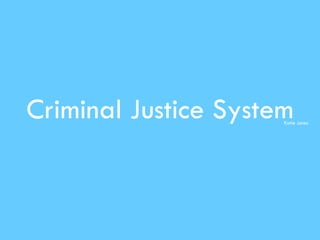
Criminal Justice System Explained
- 1. Criminal Justice System Katie Jones
- 2. Someone commits a crime and then victim of the crime is asked to give a statement to the police. Breaking the Law…
- 3. When the police arrive at the scene of the crime they ask the person who committed the crime questions.
- 4. If the police think they are guilty they arrest them. The person who committed the crime can ask for help from a solicitor.
- 5. Charges … The police officer who is responsible for investigating the crime will question the person who has been arrested. Questioning can last up to 72 hours!
- 7. A charged person goes to the magistrates court. The charge sheet that explains what the person is accused of will be read out. Remand …
- 8. The solicitor might ask for bail. The magistrates will decide whether to remand into custody or on bail.
- 9. Remanded in custody Someone who has been charged must stay locked up until they appear in court again. Remanded on bail This means they are charged with a crime but can go free until they appear in court again.
- 10. The person who committed the crime and the solicitor will write down what they said happened. The police will help other people who saw what happened write down what they saw. They are called witnesses. Get Ready For Court …
- 11. The Crown Prosecution Service (CPS) gather all the information from the police and use this to decide if the person did commit the crime.
- 12. The Magistrates Court … The person who committed the crime goes to the magistrates court. There is no jury in a magistrates court, only magistrates. The magistrates make all the decisions. The defendant can say whether they are guilty or not guilty.
- 13. If the defendant says they are guilty, then the magistrates make a decision on a punishment. If they say they are no guilty then the CPS tells the court why they think they are guilty.
- 14. For the most serious crimes, like murder, the defendant has to go to the Crown Court. A crown court has a judge and a jury that make decision. A jury is 12 people. The Crown Court …
- 15. The jury listen to reasons why that person might be guilty or innocent and make a decision. At least 10 people from the jury must agree for them to give a verdict. 10
- 16. The Sentence … If the judge give the defendant a punishment, this means the defendant becomes a convicted criminal. To decide on the sentence the judge has to review and think about the crime committed.
- 17. Only for serious crimes will the criminal go to prison. For crimes not as bad they normally have pay a fine or do community work.